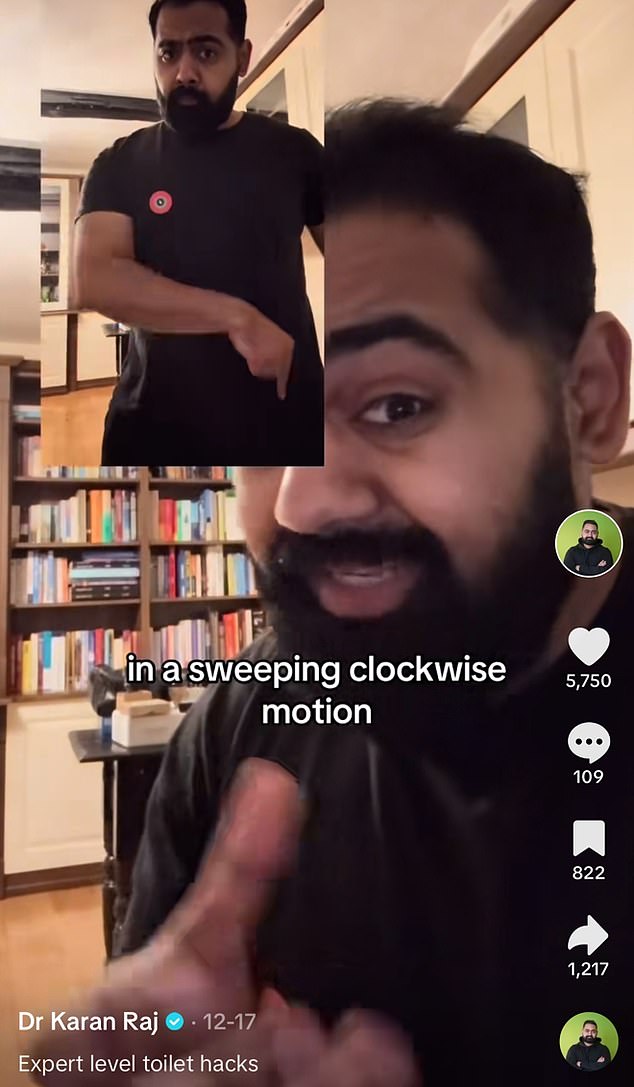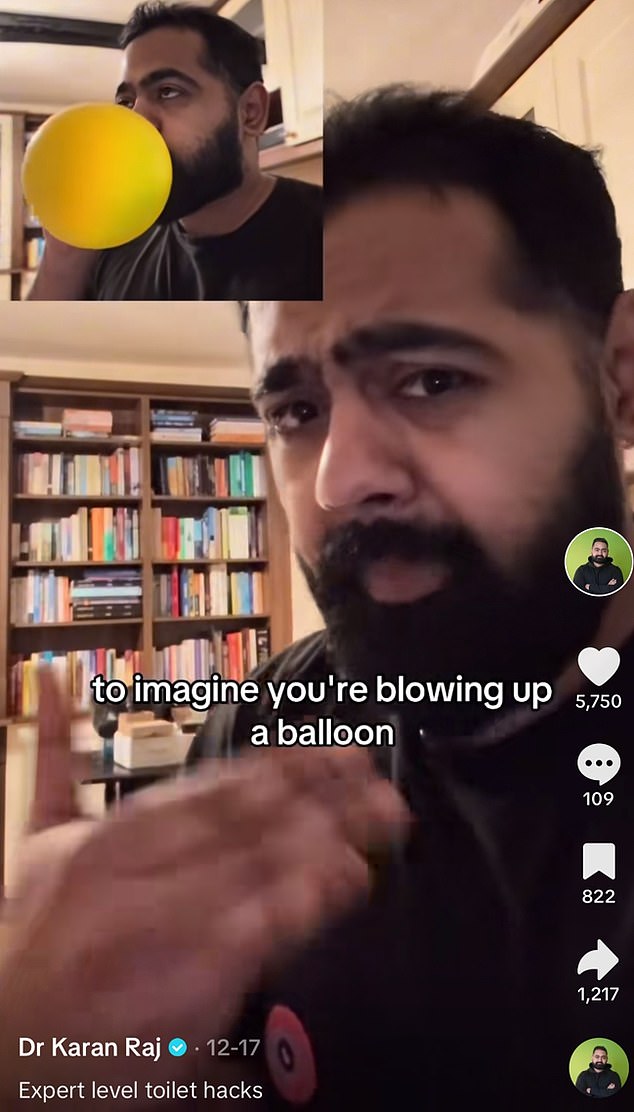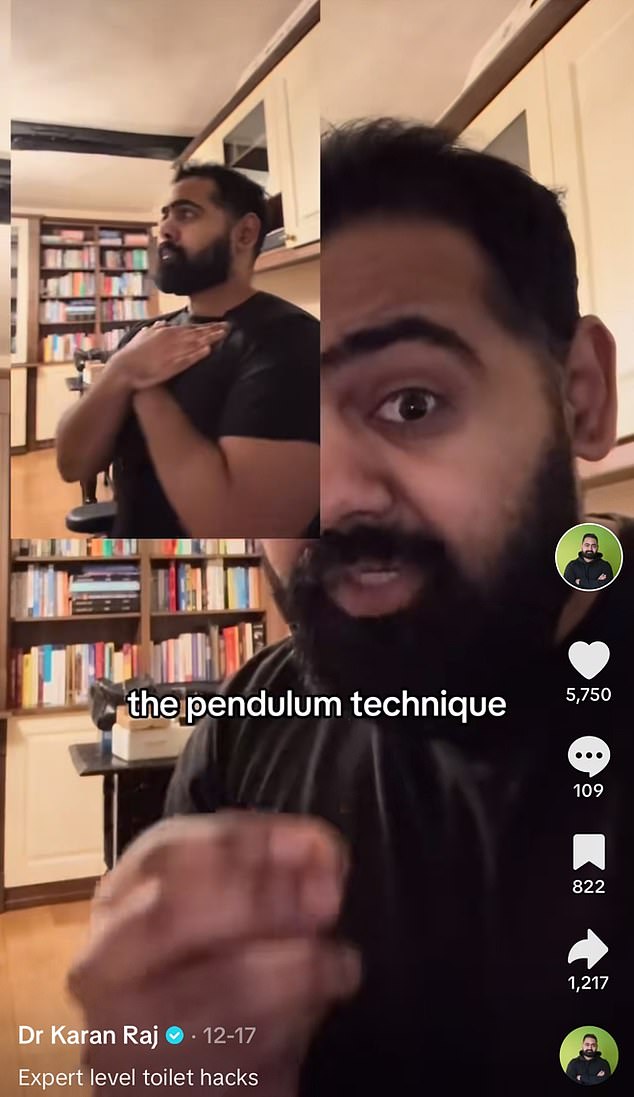The UK’s leading bowel doctor has revealed a surprising drug-free method that is scientifically proven to relieve constipation instantly.
In a recent TikTok post, NHS surgeon Dr Karan Rajan demonstrated “the pendulum technique”: gently rocking back and forth on the toilet to help the intestines move.
The doctor, who has more than 5.3 million followers on the app, was responding to a viral video in which a user suggested that squatting on a vibrating exercise platform could have a mild laxative effect.
Dr. Rajan, known as Dr. Karan Raj on TikTok, agreed that it could work, but called the method “expensive and very impractical.”
He argued that the same effect could be achieved by simply physically rocking back and forth while sitting on the toilet.
He said: “This movement can trigger mechanical stimulation to increase colonic motility.”
He added that leaning forward, specifically, relaxes the pelvic floor, which is the cradle of muscles at the base of the pelvis that controls continence.
To evacuate the intestines, the pelvic floor must be relaxed; On the contrary, the effort can cause it to tense up, which has the opposite effect to that desired.
In the same video, Dr. Rajan described another method of getting the intestines moving, suggesting that relief can be found by “becoming your own masseuse.”
Dr Rajan said: “There is evidence that abdominal massages with broad clockwise movements can help, but always make sure to go from right to left along the path of the intestine to stimulate peristalsis.”
Peristalsis moves food through the digestive system by causing the muscles of the esophagus, stomach, small intestine, and large intestine to contract in a wave-like motion.
Rubbing the abdomen can also trigger these muscle contractions.
Dr. Rajan also suggested a third exercise that he says helps relax the pelvic floor.
He told viewers to exhale gently and steadily, “imagining that they are blowing up a balloon or blowing out candles.”
He added: “This diaphragmatic breathing technique stimulates the vagus nerve to help better coordinate the relaxation of the pelvic floor muscles so that they strain less.”
The vagus nerve controls peristalsis, the wave-like contractions that move digested food through the intestines. It also helps control the pelvic floor.
Constipation can cause people to strain and strain when they have a bowel movement.
In a recent TikTok post, NHS surgeon Dr Karan Rajan demonstrated the ‘pendulum technique’ – gently swinging back and forth on the toilet to help the bowels move.

In the same clip, Dr. Rajan described another method of getting the intestines moving, suggesting that relief can be found by “becoming your own masseuse.”

He said: “This diaphragmatic breathing technique stimulates the vagus nerve to help better coordinate the relaxation of your pelvic floor muscles so you strain less.”
But this can cause problems such as hemorrhoids and anal fissures.
Hemorrhoids are engorged blood vessels that form lumps in and around the anus, which can itch and bleed.
A fissure is a tear that develops in the lining of the large intestine, near the anus. It can cause sharp pain when removing waste and can also cause bleeding.
Both problems can resolve on their own, especially if constipation is treated and avoided; However, a small number of patients may need to undergo treatments or even surgery.
Eating more fiber, drinking plenty of water, and exercising more can help relieve constipation.
Dr. Rajan has previously said that kiwi, rich in soluble fiber, is the best fruit to relieve constipation.
This is the type of fiber that attracts water to form a gel in the intestine, softening stool and increasing the frequency of bowel movements.
At high doses, you get all the constipation relief that laxatives offer “without the associated side effects,” Dr. Rajan said.
Other foods rich in soluble fiber include figs, avocados, flax seeds, and apples.
Experts have also claimed that people in Western countries are emptying their bowels incorrectly and should be squatting instead of sitting.
Sitting is said to prolong the process and prevent our intestines from opening fully.
Some experts advise opening the intestines by sitting with your feet on a small stool and leaning forward.


